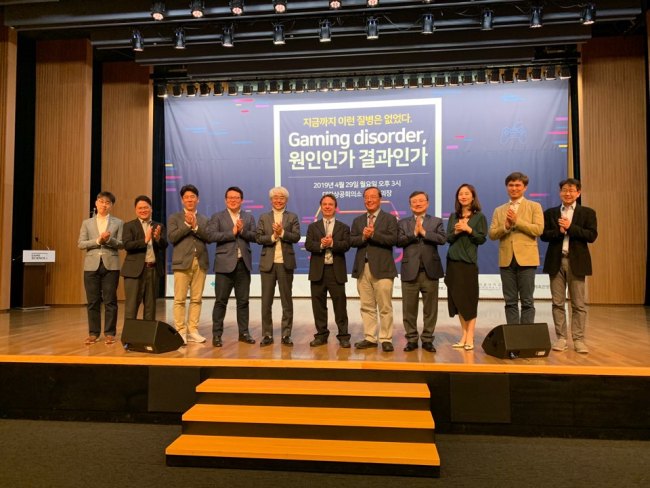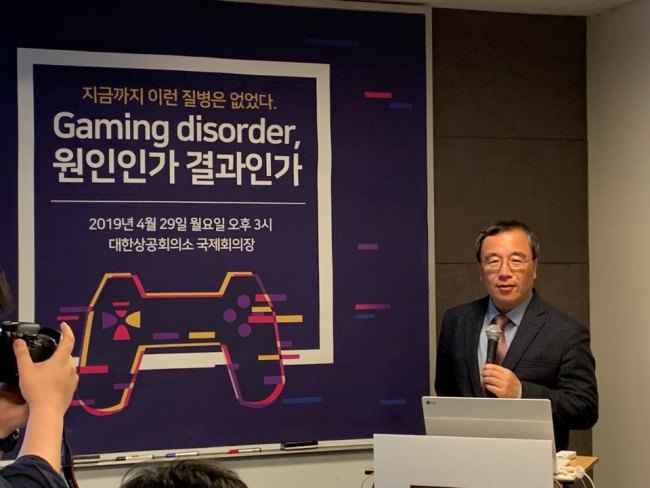Although addiction to gaming should be categorized as a mental health issue according to the new guidelines of the World Health Organization, debate has persisted on how to draw the line on addiction, and whether existing regulations to mitigate such risks are appropriate.
Researchers gathered at the Game Science Forum in Seoul on Monday to explore the implications of gaming disorder being highlighted in the context of public health at a forum on gaming and science, where participants cautioned against jumping to conclusions.
The event came amid ongoing disputes over whether excessive gaming and addiction in extreme cases should be formally classified as a medical disorder. The World Health Organization proposed “problematic gaming” as a potential new diagnosis in its 11th revision of the International Classification of Diseases in June last year, setting off mixed responses from academia.
Researchers gathered at the Game Science Forum in Seoul on Monday to explore the implications of gaming disorder being highlighted in the context of public health at a forum on gaming and science, where participants cautioned against jumping to conclusions.
The event came amid ongoing disputes over whether excessive gaming and addiction in extreme cases should be formally classified as a medical disorder. The World Health Organization proposed “problematic gaming” as a potential new diagnosis in its 11th revision of the International Classification of Diseases in June last year, setting off mixed responses from academia.


In an opening address, former Culture Minister Choung Byoung-gug said he hopes the forum would “help improve the public perception about gaming as something negative or even pathological.”
Choung, who heads the presidential committee on the “fourth industrial revolution,” said “past regulations aren’t adapting fast enough to the evolving times,” referring in particular to the Youth Protection Act’s article that restricts children under the age of 16 from playing online games between midnight and 6 a.m.
“Games will increasingly become a part of daily life in the form of recreation or other functional tools,” he said, calling for efforts to “destigmatize gaming through research.”
Christopher Ferguson, a psychology professor at Stenson University, said modern skepticism toward gaming is akin to “moral panic about every emergent technology” witnessed in history. “In the 19th century, alarm was raised against novels, and after novels, against theaters, and then against radios and television. There is a pattern to be derived.”
“A more meaningful discussion would be whether gaming is any different from other activities that people overdo,” he said, suggesting that suspicion toward gaming is “an issue promoted by technophobia.”
Citing a lack of replicability in recent studies that label gaming addiction or disorder, Ferguson said there need to be “better standardized clinical samples” before “creating a diagnosis not yet corroborated by research.”
Yoon Tae-jin, a media studies professor at Yonsei University, likewise pointed out “the absence of academic consensus” on gaming addiction. “There are currently 16 different ways of defining what game addiction is,” he said, contending the addiction “hasn’t been conceptualized in concrete terms” because it is “a notion of social discourse rather than a clinical diagnosis of an existing disease.”
Lee Kyung-min, a neurologist at Seoul National University’s college of medicine, cautioned against medicalization of a nonclinical issue, referring to gaming addiction as one such example.
“Interpreting a social phenomenon from a medical point of view poses a danger of reducing a social problem to being an individual one and possibly pathologizing a natural human variation,” Lee said.
“Medicalizing a social issue obstructs a comprehensive problem-solving effort from taking place,” he said, “because the medical approach to a problem is to treat the individual by controlling the symptoms rather than examining the much larger surroundings -- such as family, school, or the society.”
“Overgaming should be dealt with as a self-control development problem rather than a stand-alone disorder,” he said.
Lee noted the importance of play in brain development, calling attention to the often ignored positive usage of gaming such as in treatment of dementia.
Launched in September 2018, the Game Science Forum is composed of 17 scholars in related fields including neurology, psychiatry, psychology, cognitive science, game software, media and communication studies. Monday’s event was organized by Seoul National University’s Institute for Cognitive Science and sponsored by the Ministry of Culture, Sports and Tourism.
By Kim Arin (arin@heraldcorp.com)








![[Kim Seong-kon] Democracy and the future of South Korea](http://res.heraldm.com/phpwas/restmb_idxmake.php?idx=644&simg=/content/image/2024/04/16/20240416050802_0.jpg&u=)








![[KH Explains] Hyundai's full hybrid edge to pay off amid slow transition to pure EVs](http://res.heraldm.com/phpwas/restmb_idxmake.php?idx=652&simg=/content/image/2024/04/18/20240418050645_0.jpg&u=20240418181020)

![[Today’s K-pop] Zico drops snippet of collaboration with Jennie](http://res.heraldm.com/phpwas/restmb_idxmake.php?idx=642&simg=/content/image/2024/04/18/20240418050702_0.jpg&u=)